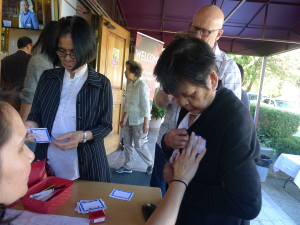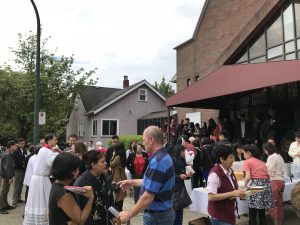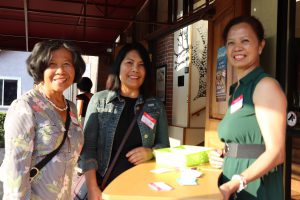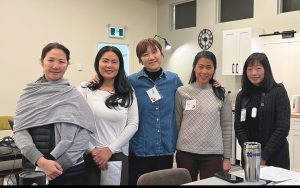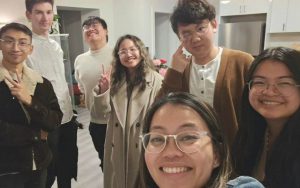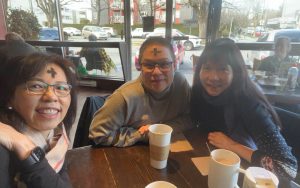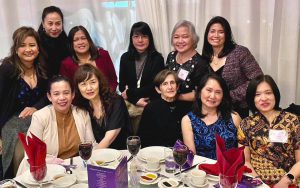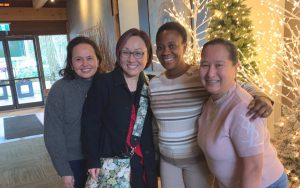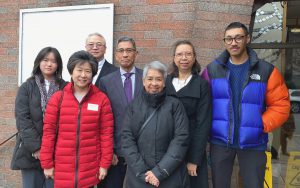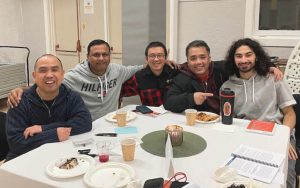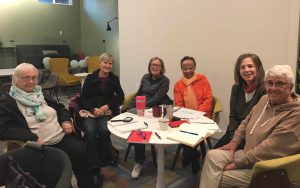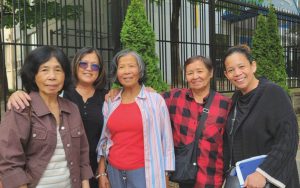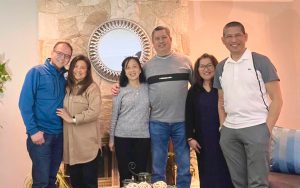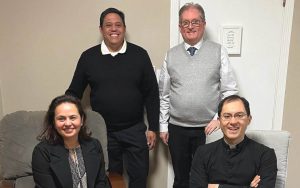Today, we’re talking about community, and let’s begin with the three kinds of friendship according to the Greek philosopher Aristotle. Friendships of utility are when we associate together because there’s a mutual advantage: We help each other on a sports team, work together in class, or we’re business partners. Friendships of pleasure are those in which we find people interesting, amusing, or fun to be with. Friendships of virtue are when we have the common goal of improving our character.
Whenever people hear these three kinds of friendship, they right away start assessing their own relationships. Who are the people with whom we spend time because it serves a purpose? It’s not wrong in and of itself, but, like friendships of pleasure, these relationships fade away when people are no longer fun to be with or if our interests change. While these relationships can be good, they don’t fill the heart. We can feel very lonely without friendships of virtue.
Looking at today’s Gospel, we can see that God made us for friendships and family. We’re supposed to find happiness with people who want to become virtuous (and with whom we have things in common), as well as a family, which is a mix of people who are related by marriage or blood.
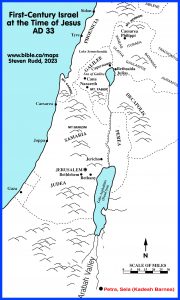 At the beginning of the Gospel, it says, “Among those who went up to worship at the festival were some Greeks. They came to Philip, who was from Bethsaida in Galilee, and said to him, ‘Sir, we wish to see Jesus.’ Philip went and told Andrew; then Andrew and Philip went and told Jesus” (Jn 12:20-22). There’s something hidden but significant here: Why do the Greeks approach St. ‘Philip’ and St. ‘Andrew’? Because they’re the only two apostles with Greek names. Jesus and the 12 apostles were all Jewish, and their faith was Jewish. Yet, throughout history, there had always been some non-Jewish people who came to believe in the Lord, the one God. So, during the Passover ‘festival’ there ‘were some Greeks,’ who, in a very human way, approach the apostle who probably speaks Greek. The author, St. John, reminds us that St. Philip ‘was from Bethsaida in Galilee,’ which had more contact with Greek people than say, Jerusalem, in the south. And then St. Philip gets the other apostle with a Greek name and they go to tell Jesus. This is great! This is often the starting point of building a friendship. When we go to a gathering of people, we naturally look for people of the same age, that might dress similarly, because we have something in common.
At the beginning of the Gospel, it says, “Among those who went up to worship at the festival were some Greeks. They came to Philip, who was from Bethsaida in Galilee, and said to him, ‘Sir, we wish to see Jesus.’ Philip went and told Andrew; then Andrew and Philip went and told Jesus” (Jn 12:20-22). There’s something hidden but significant here: Why do the Greeks approach St. ‘Philip’ and St. ‘Andrew’? Because they’re the only two apostles with Greek names. Jesus and the 12 apostles were all Jewish, and their faith was Jewish. Yet, throughout history, there had always been some non-Jewish people who came to believe in the Lord, the one God. So, during the Passover ‘festival’ there ‘were some Greeks,’ who, in a very human way, approach the apostle who probably speaks Greek. The author, St. John, reminds us that St. Philip ‘was from Bethsaida in Galilee,’ which had more contact with Greek people than say, Jerusalem, in the south. And then St. Philip gets the other apostle with a Greek name and they go to tell Jesus. This is great! This is often the starting point of building a friendship. When we go to a gathering of people, we naturally look for people of the same age, that might dress similarly, because we have something in common.
But, Jesus’ reply is interesting: “Philip went and told Andrew; then Andrew and Philip went and told Jesus. Jesus answered them, ‘The hour has come for the Son of Man to be glorified’” (12:22-23). What’s the connection between what just happened and Jesus’ statement? The answer is that ‘the hour has come’ for Him to die and rise for all humanity because finally some non-Jewish people are not only ready to believe in Him but come to worship at the Temple. Jesus had taught that His mission was to gather not just the Jewish people, but all of humanity throughout time, into one family under God the Father. At the end of today’s Reading, He says, “And I, when I am lifted up from the earth, will draw all people to myself” (Jn 12:33). Hundreds of years before, the prophet Isaiah predicted that, in the end times, Gentiles would come to worship in Jerusalem (60:1-7). Now that some have come, it’s now time for Jesus to lay down His life and rise again.
One thing we need to remember from the Bible is that God is our Father and wants us all to be one family. We believe that the Catholic Church is that family on earth. Allow me to explain.
What unites Catholics? We’re in every single country across the world, we’re of different races, different ages, different histories, speak different languages, and have different customs, but, four things unite us, one invisible (which is love), and three visible (our faith: what we believe; our Sacraments: how we worship God; and apostolic succession: every Catholic throughout the world follows a bishop who’s in union with the successor of St. Peter for 2,000 years) (Catechism of the Catholic Church, 815). Despite the faults of many Catholics, one thing everyone marvels at is the unity of the Church, because no institution or idea has had so much cohesion for so long.
Compare this to race. E.g., what unites Chinese people? Generally speaking, we’re of the Han race, have a shared history and cuisine, usually speak Chinese except for ignorant people like myself, etc. But, we don’t have the same beliefs, same leadership, or same way of praying.
Compare this to being Canadian. According to Canada.ca, in order to become Canadian, we have to be a permanent resident, live in Canada for three out of five years, file super high taxes, pass a citizenship test, prove our language skills in English or French, and take an oath of citizenship. Remember when Prime Minister Trudeau said that some Canadians “hold unacceptable views”? We’re allowed to, because being Canadian is not a religion.
However, because there’s a void of common beliefs in Canada, something will try to fill the vacuum. There are a number of intellectuals who suggest that wokeism is a kind of religion: It’s based on the idea that you must believe certain things; if you don’t, you’ll be cancelled.
Now, without Jesus, Christianity and the Catholic Church would fall into so many errors. The commonality that makes our faith work is Jesus, the one human Who is also God, Who knows and loves humanity perfectly because He made us. One of the greatest blessings which we don’t deserve is being part of His family.
Now let’s see how we’re living community in our parish family. This is the fourth homily in our Big Picture series examining the five systems or purposes of a church, and the first blessing to highlight is what happens around Sundays: We can spend a bit of time after Mass, go to the Sunday brunches and the CWL Café, and reach out to people during Name Tag Sundays. These times open up opportunities to build Christian relationships. To live an authentic Christian life, we need each other, and others need us. And our parish family is healthy insofar as each of us knows and loves each other.
So, ask yourself: Do you have good relationships with people here? It probably depends on how much time you put in. Generally speaking, if we were all to leave right after Mass every Sunday, we’d have a weaker community. Other questions: Are people happy to see you when you come here? Do they smile at you? Do you smile at them? So, think about if you make our parish stronger or weaker.
The second blessing to highlight is our Life Groups. If you’ve made Jesus the center of your life and want to journey with other disciples, consider joining a Life Group.
The foundation is that we have a common pursuit of becoming like Jesus—we often can’t get this with our family and friends, or it’s not as intentional. We commit to meeting every two weeks because we don’t wait until there’s a spiritual problem, but stay nourished all the time. Right now, we praise God for the 26 groups and the 123 people sharing life in them. If you’re a disciple, please talk to Ricky about forming a group.
Let’s conclude: It’s normal that we reach out to people who are like us—it’s a joy to share common interests. But God made us to be part of His family. Go to Mass anywhere in the world and you’ll find your spiritual family. You may not speak the language, but it’s the same Mass, same faith, and same leadership. Within this huge family, let’s pray that we all find friendships of virtue. God the Father made us to find happiness in friendships and family.


